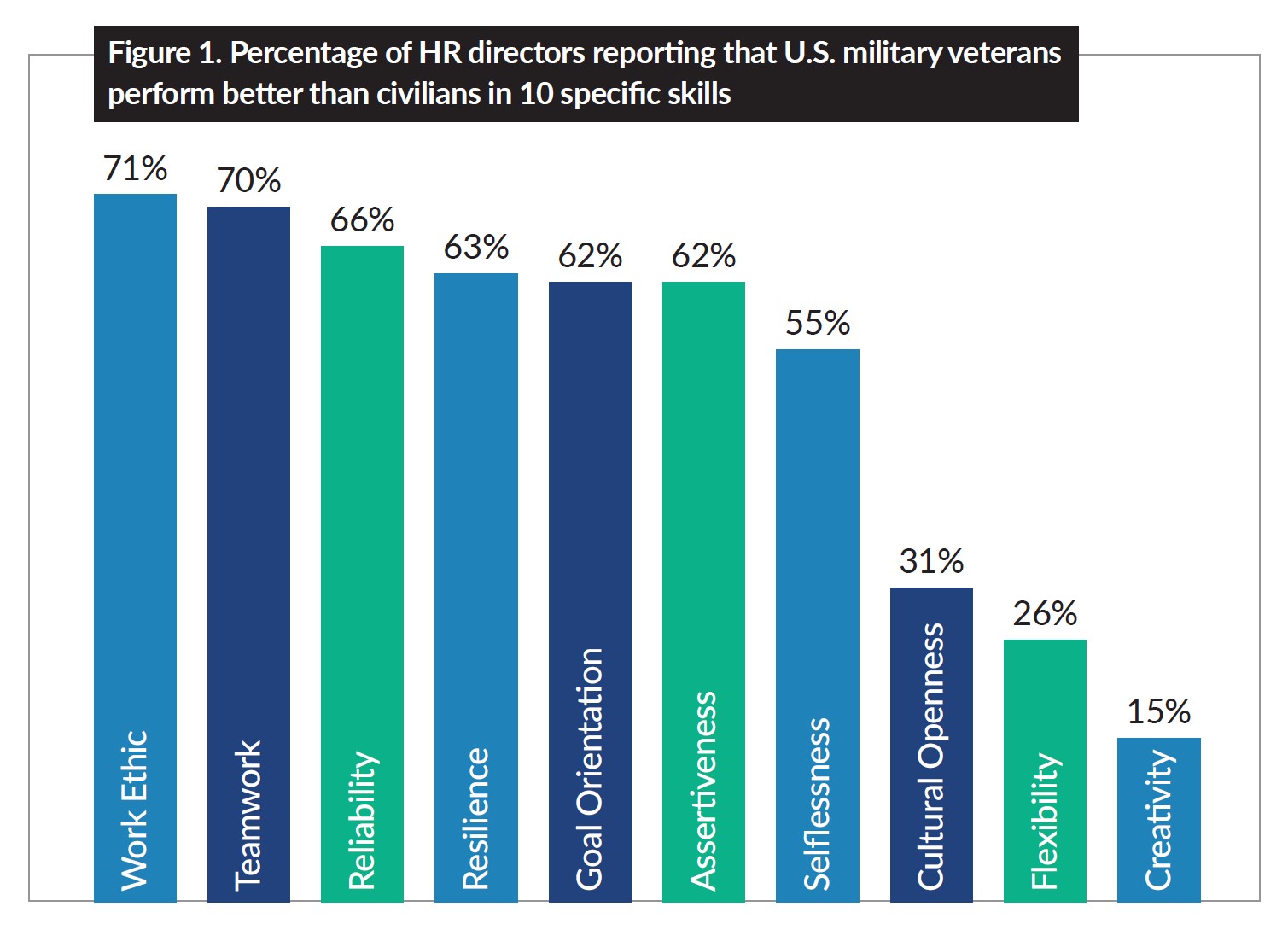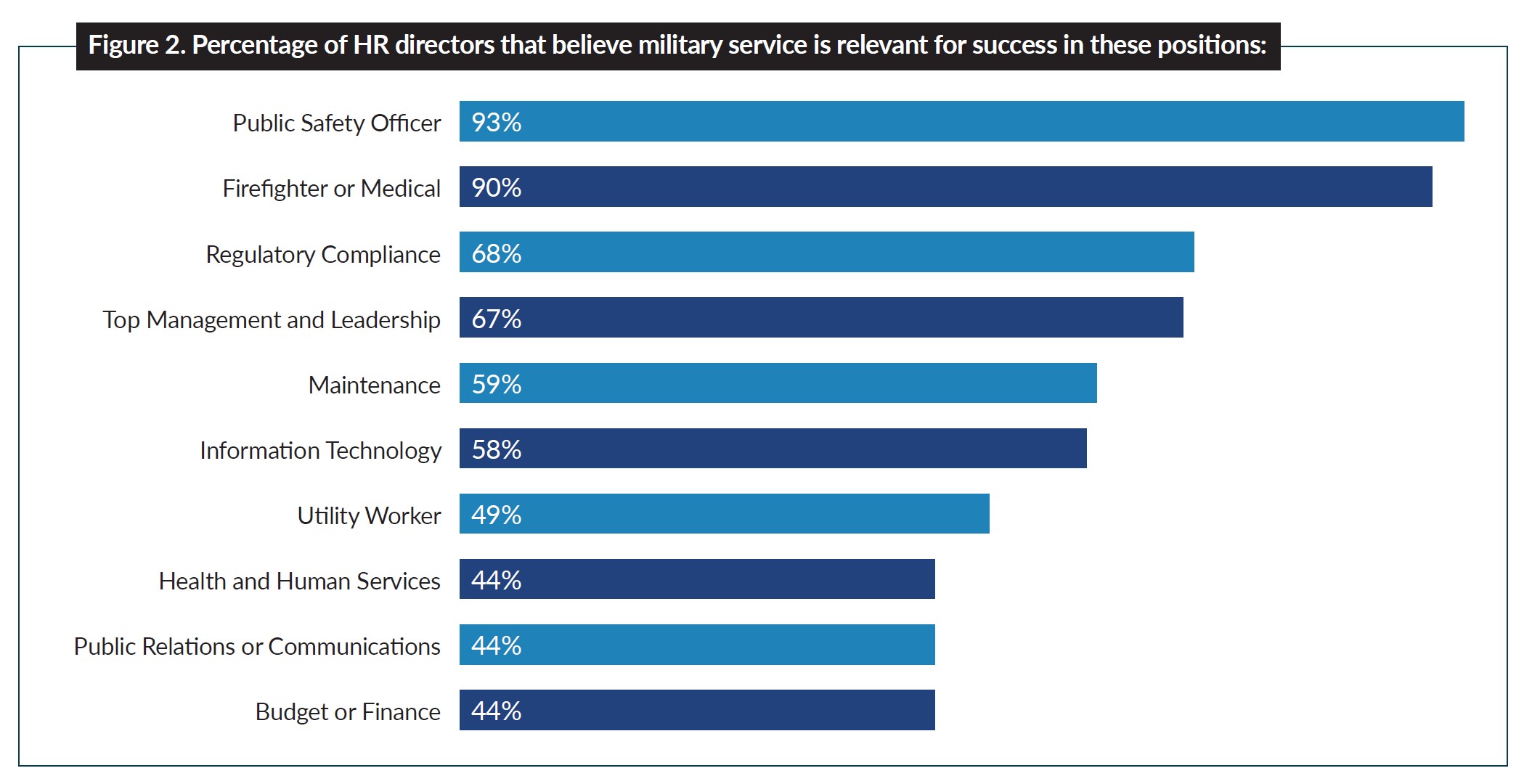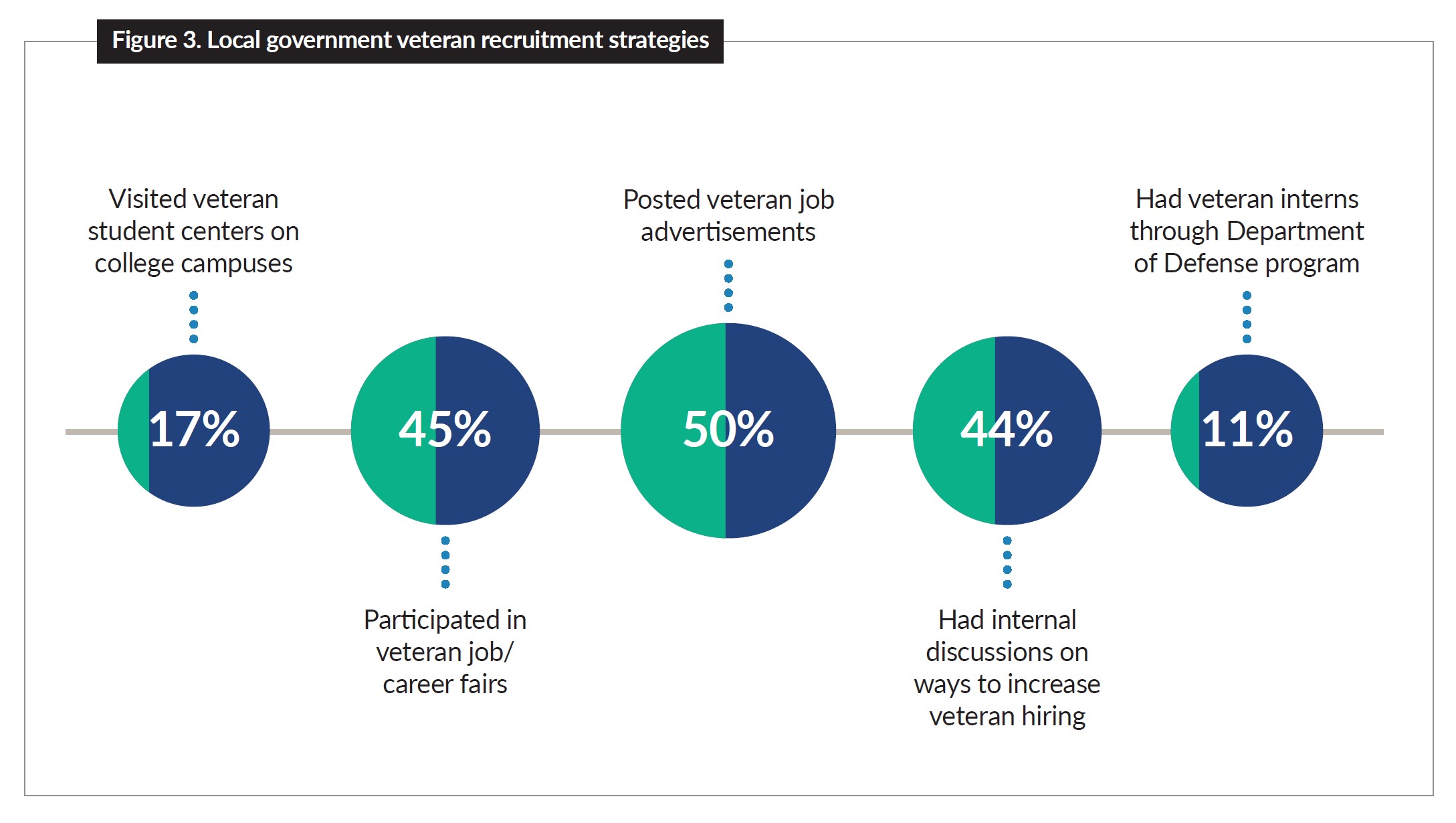
As of 2018, there were approximately 18 million U.S. military veterans, three million of whom were under the age of 40.1 Practitioners and researchers alike have given considerable attention to the federal government’s recruitment of U.S. military veterans into public service in recent years, especially as it relates to the use of veterans’ preference policies.2
While the federal government provides one important pathway to public service careers for veterans, local governments also provide many opportunities for a functionally and geographically diverse set of public service careers. Yet relatively little is known about the recruitment and hiring of U.S. military veterans in U.S. local governments. U.S. military veterans often have a wealth of leadership experience, as well as a wide range of general, managerial, logistical, and technical skills and competencies that can be quickly adapted to meet the needs of local governments.
We brought together resources from Arizona State University’s Center for Urban Innovation and Center for Organization Research and Design (CORD) to partner with the Center for State and Local Government Excellence (now known as the MissionSquare Research Institute), the National League of Cities, and the Alliance for Innovation and conducted a survey about the hiring of U.S. military veterans in U.S. local governments. The survey focused on:
• The implementation and use of veteran’s preference policies in local government hiring.
• The types of jobs for which U.S. military veterans are commonly hired in local governments.
• The perceptions of the strengths and skills that U.S. military veterans bring to their organizations.
• The premium that human resources (HR) directors place on veteran experience relative to those without.
• Local government efforts to recruit U.S. military veterans to their organization.
We built a sample of 911 cities and towns ranging in population from 25,000 to 250,000, as well as 575 counties from the largest 1,000 counties in the nation. We then distributed the survey over a period from February into June of 2020 (with a pause of several weeks due to the outbreak of COVID-19) to HR directors (or equivalent) using multiple mechanisms: mailed letters, postcards, emails, and phone calls. We collected 538 usable responses to analyze from our city and county HR directors.
Veteran Preference Policies in Local Governments
We asked a series of questions designed to illustrate the extent to which local governments are implementing a veteran’s preference policy. Overall, just over half of local governments (52 percent) reported giving some form of a formal preference to U.S. military veterans in hiring processes. We were also interested in whether HR directors perceive these policies to be clear. Such policies need to be clear and understood by those responsible for implementation. We therefore asked about how specific their preference policy is on an 11-point scale ranging from very vague to very specific. About three of every four respondents (74.5 percent) scored their policy at “7” or higher on its specificity. Only about 8.3 percent said their policy was vague, with scores at or below “3.” While they reported relatively good specificity, less than two-thirds (57 percent) rated their policy “successful” at promoting veteran hiring.
Veteran Employees’ Skills and Competencies
A central aspect of the survey focused on how local government leaders assess and think about the skills veterans bring to their organization. HR directors recognize that military training provides individuals with both the technical and leadership skills that local governments seek among their applicants and that those skills quickly can be adapted to a variety of jobs. Among our survey respondents:
• 71 percent said that veteran employees, on average, have a stronger work ethic than their civilian counterparts.
• 70 percent said that veteran employees, on average, have a stronger team orientation than their civilian counterparts.
• A majority of HR directors rated veteran employees higher than civilian employees on seven of the ten general skills listed in Figure 1.
When we asked the HR directors to rank the skills that military experience enhances the most, they responded: (1) teamwork, (2) problem solving, and (3) planning/organization.

Many local governments miss the opportunity veterans represent to tap these skills. Even those jurisdictions that recruit veterans to apply for jobs sometimes funnel them to positions in law enforcement and public safety. In fact, the vast majority of responding HR directors said they think military service is relevant preparation for positions as public safety officers (93 percent) and firefighter or medical (90 percent). Perhaps not surprisingly, these respondents also reported that their organizations hired veterans into these positions at higher rates than other types of positions (81 percent and 71 percent, respectively). See Figure 2.

However, many veterans resist this pigeonholing while seeking other positions they feel better fit their skill set. For instance, two-thirds (67 percent) of responding HR directors said military training is relevant for preparing someone to be successful in top management or leadership positions. However, only one-fifth (20 percent) said their organization “often” or “very frequently” hired veterans into such positions. Local governments are missing the wider array of skills represented by those veterans trying to get into public service after their military service is complete.
The Premium on Veteran Experience
While HR directors may be missing some of the talent represented by veterans, this does not mean the directors are dismissing the value of military experience. In fact, there is a common misconception that HR directors may have a negative bias toward veteran applicants due to possible experiences during their military service. Our results suggest otherwise.
We presented each respondent one of six randomly assigned résumés of a hypothetical recent MPA graduate that were identical except on gender, military experience, and previous local government versus private sector experience. The preliminary results clearly suggest that while there are no differences between male and female applicants in terms of the evaluation provided by the directors, they rated the candidate résumés with veteran experience more highly when assessing leadership potential and value of public sector experiences relative to prior experience in the private sector.
Recruitment
HR directors indicated that local governments undertake a range of activities in order to attract and recruit veteran applicants to their organization. For instance, we found that half of these local governments post job advertisements in outlets that specifically target military veterans. However, only about 17 percent take advantage of veteran student centers on nearby two- or four-year college campuses. See Figure 3.

While these efforts are important, we have noted previously that local governments may not be taking full advantage of the broad range of public service careers and functions for which military service may prepare individuals. If recruitment efforts focus on jobs in law enforcement and fire/emergency response, local governments may be missing excellent candidates for leadership roles, IT, budgeting and finance, and other positions. Colleges and universities can help local governments expand the exposure to, the appeal of, and the range of public service opportunities in a manner that increases the talent pipeline.
Professional organizations represent another venue for connecting veterans with local government organizations. The International City/County Management Association’s Veterans Advisory Committee, for example, is helping local government talent managers take greater advantage of the extensive array of talent generated by military service through three initiatives:
1. Raising awareness of the skillsets that veterans have to offer.
2. Recruiting those with military service into the local government profession.
3. Building and strengthening relationships between the military community and local governments.
Through their strategic outreach to city/county administrators, HR directors, and other professional associations, ICMA’s veterans programs are helping increase career connections between veterans and local government.
Conclusion
The findings from our survey highlight several insights into current veteran recruitment and hiring practices in U.S. local governments. Many jurisdictions recognize the value in recruiting future public servants among U.S. military veterans by giving preference to veterans in hiring and/or promotion decisions. They see veterans as competent workers, outranking their civilian counterparts on a range of general and technical skills and competencies. Yet, at the same time, there is a narrow and limited recognition of the functional areas and types of positions to which U.S. military veterans’ skillsets apply. We find that HR directors see a very strong “fit” between veterans’ skills and positions within law enforcement and emergency response, but much less so for other positions such as IT, budget/finance, and management.
To reap the immense potential more fully that veterans hold for contributing to the work of U.S. local governments, we recommend jurisdictions start applying a broader and more encompassing approach to the functional areas in which U.S. military veterans can excel. This task does not simply fall on U.S. local governments, but also highlights a greater need for mapping out and designing successful curriculum and educational programs to help veterans transition and adapt their existing skills to the new world of public service in a local government context.
DAVID SWINDELL is associate professor and director of Arizona State University’s Center for Urban Innovation. (David.Swindell@asu.edu)
JUSTIN M. STRITCH is associate professor and research affiliate at the Center for Organization Research and Design at Arizona State University. (jstritch@mainex1@asu.edu)
ULRICH JENSEN is an assistant professor in Arizona State University’s School of Public Affairs. (Ulrich.Jensen@asu.edu)
Endnotes and Resources
1 Statistics and other data available from the U.S. Department of Veteran’s Affairs at https://www.va.gov/vetdata/veteran_population.asp
2 For details of the federal policy, see https://www.opm.gov/policy-data-oversight/veterans-services/vet-guide-for-hr-professionals/
New, Reduced Membership Dues
A new, reduced dues rate is available for CAOs/ACAOs, along with additional discounts for those in smaller communities, has been implemented. Learn more and be sure to join or renew today!
